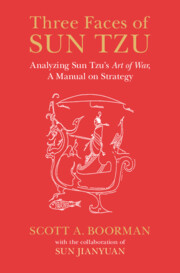Book contents
- Three Faces of Sun Tzu
- Frontispiece
- Three Faces of Sun Tzu
- Copyright page
- Contents
- Figures
- Tables
- Acknowledgments
- Author’s Note on Chinese-Language Romanization
- Author’s Note on Chinese Characters
- Author’s Note on Online Annex
- Chronology of Chinese History
- List of Abbreviations for Frequently Cited Works
- Introduction
- Background: Historical and Textual
- Preliminaries
- A Strategist Should Be Calculating
- B Strategist Should Be Cheap
- C Strategist Should Find Advantage
- D Strategist Should Enact Stratagems and Formlessness
- E Strategist Should Make a Situation’s Natural Dynamics Work for Her
- F Strategist Should Have an Accurate Grasp of the Significant Information
- G Strategist Should Manage the Interfaces
- Conclusion
- Index A
- Index B
Conclusion
Demystifying Sun Tzu and Future Directions
Published online by Cambridge University Press: 07 March 2024
- Three Faces of Sun Tzu
- Frontispiece
- Three Faces of Sun Tzu
- Copyright page
- Contents
- Figures
- Tables
- Acknowledgments
- Author’s Note on Chinese-Language Romanization
- Author’s Note on Chinese Characters
- Author’s Note on Online Annex
- Chronology of Chinese History
- List of Abbreviations for Frequently Cited Works
- Introduction
- Background: Historical and Textual
- Preliminaries
- A Strategist Should Be Calculating
- B Strategist Should Be Cheap
- C Strategist Should Find Advantage
- D Strategist Should Enact Stratagems and Formlessness
- E Strategist Should Make a Situation’s Natural Dynamics Work for Her
- F Strategist Should Have an Accurate Grasp of the Significant Information
- G Strategist Should Manage the Interfaces
- Conclusion
- Index A
- Index B
Summary
Through textually grounded "reverse engineering" of Sun Tzu’s ideas, this study challenges widely held assumptions. Sun Tzu is more straightforward, less "crafty," than often imagined. The concepts are more structural, less aphoristic. The fourteen themes approach provides a way of addressing Sun Tzu’s tendency to speak to multiple, often shifting, audiences at once ("multivocality"). It also sheds light on Sun Tzu’s limitations, including a pervasive zero-sum mentality; focus mostly on conventional warfare; a narrow view of human nature. Sun Tzu’s enduring value is best sought in the text’s extensive attention to warfare’s information aspects, where Sun Tzu made timeless contributions having implications for modern information warfare and especially its human aspects (e.g., algorithm sabotage by subverted insiders). The text points opportunities for small, agile twenty-first-century strategic actors to exploit cover provided by modern equivalents to Sun Tzu’s "complex terrain" (digital systems, social networks, complex organizations, and complex statutes) to run circles around large, sluggish, established institutional actors, reaping great profit from applying Sun Tzu’s insights.
Keywords
- Type
- Chapter
- Information
- Three Faces of Sun TzuAnalyzing Sun Tzu's <i>Art of War</i>, A Manual on Strategy, pp. 491 - 521Publisher: Cambridge University PressPrint publication year: 2024

